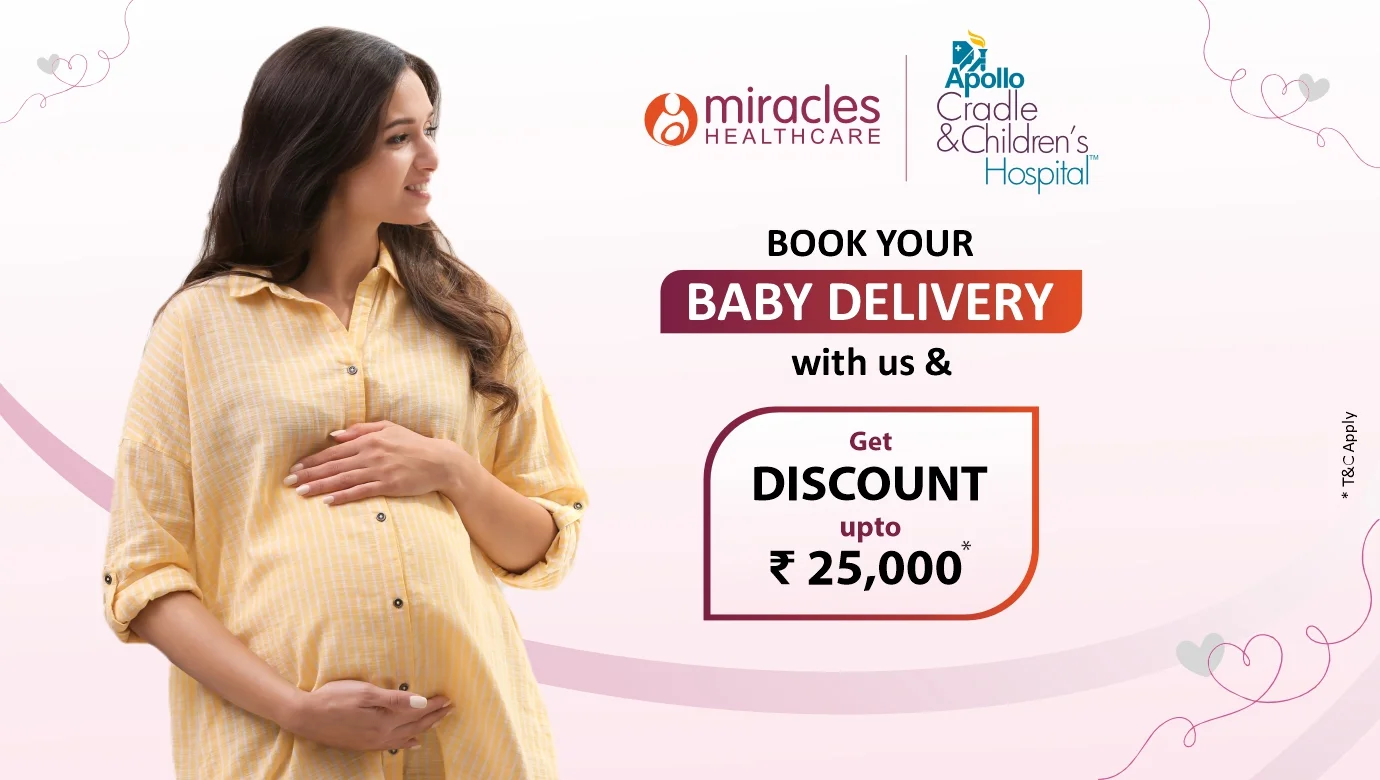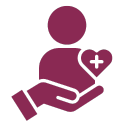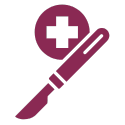Gynaecology Conditions We Treat
Comprehensive Care for Your Health

Birth defects are differences in the development of your child’s body. Several types of birth defects occur because of several factors. There are several treatments to reduce symptoms or repair any structural abnormalities.
Miracles Apollo Cradle is recognized as the premier gynecology hospital in Gurgaon, known for its exceptional care for children with birth defects. Our approach involves the entire spectrum of services, from diagnosis to treatment and ongoing support. The hospital boasts a team of highly skilled specialists, including pediatricians, gynecologists, geneticists, and experts in various fields relevant to birth defects. We fully comprehend the challenges faced by your child and are dedicated to providing comprehensive support throughout their journey to health and wellness.
Birth defects are structural changes present at birth that can affect any part of the body, including the heart, brain, feet, and organs. They may impact both the appearance and function of the body and can range from mild to severe.
There are several different types of birth defects, Some Common types include:
Congenital Heart Defects: Structural issues in the heart present at birth.
Cleft Lip and Palate: Facial structure defects where lip and palate do not merge properly.
Neural Tube Defects: Abnormalities in the closure of the neural tube during pregnancy.
Down Syndrome: A genetic disorder caused by an extra copy of chromosome 21.
Birth defect symptoms can vary depending on the specific defect. However, some general signs and symptoms that may indicate a birth defect include:
Abnormal appearance of the head, face, eyes, ears, or mouth
Abnormal shape or size of the limbs or hands
Difficulty sucking, swallowing, or coordinating the feeding movements.
Slow growth or delayed development
Frequent infections
Seizures
Sensory problems
Cognitive disabilities
Intellectual disabilities
Behavioral problems
Physical disabilities
If you have any concerns about your child's development or suspect they may have a birth defect, it is important to consult with a nearby gynecologist.
In many cases, there is no single cause, but a combination of different factors.
Genetic Factors:
Chromosomal Abnormalities: These abnormalities occur when there is an extra or missing chromosome, or when there is a rearrangement of chromosomal material.
Single-Gene Defects: These are caused by mutations in a single gene.
Environmental Factors:
Maternal exposure to certain medications or chemicals during pregnancy.
Maternal infections during pregnancy.
Nutritional deficiencies.
Other medical conditions.
Birth defects can be diagnosed before, during, or after birth when symptoms become clear.
The tests to diagnose birth defects include:
Prenatal Tests:
Ultrasound: The USG is a non-invasive imaging technique that uses sound waves to create images of the developing baby inside the womb. It can detect structural abnormalities, such as cleft lip and palate, neural tube defects, and congenital heart defects.
Amniocentesis: The procedure of amniocentesis involves removing a small sample of amniotic fluid(the fluid surrounding the baby in the womb) The amniotic fluid is then tested for chromosomal abnormalities, genetic disorders, and certain infections.
Chorionic Villus Sampling (CVS): The procedure of CVS involves taking a sample of placental tissue, which is attached to the developing baby and contains the same genetic material as the baby's cells. The tissue is tested for chromosomal abnormalities and certain genetic disorders.
Tests After Birth:
Physical Examination: A pediatrician conducts a thorough physical examination to identify visible signs of birth defects, such as abnormal facial features, limb deformities, or heart murmurs.
Blood Tests: Blood tests can detect specific genetic conditions, metabolic disorders, or infections that may contribute to birth defects.
Imaging Tests: X-rays, CT scans, and MRIs can provide detailed images of internal structures, allowing for accurate diagnosis of birth defects affecting bones, organs, or the brain.
Genetic Testing: Advanced genetic testing, such as chromosomal microarray analysis (CMA) and whole-exome sequencing (WES), can identify a wider range of genetic abnormalities that may be associated with birth defects.
The specific tests used to diagnose birth defects will depend on various factors such as the suspected defect, the baby's age, and the physical examination. Early diagnosis and intervention are important for managing birth defects and improving outcomes for affected children.
Generally, there is no cure for birth defects. However treatments are provided depending on the specific defect, help to relieve the symptoms and reduce the risk of life-threatening complications.
The treatment could include:
Medications: Pediatricians prescribe medication depending on the specific birth defect.
Folic Acid Supplementation: Folic acid is essential for preventing neural tube defects. It is typically recommended for all women of childbearing age and continues throughout pregnancy.
Hormone Replacement Therapy: Hormone replacement therapy is used to treat specific birth defects related to hormonal imbalances, such as congenital adrenal hyperplasia.
Antibiotics: Antibiotics are prescribed to treat infections associated with birth defects, such as congenital anomalies or neural tube defects, to prevent complications and promote healing.
Anticonvulsants: Anticonvulsants are used to control seizures in children with birth defects affecting the brain or nervous system.
Symptom-Specific Medications: Depending on the specific birth defect, medications may be used to manage symptoms such as pain, muscle spasms, or digestive issues.
Surgery: Surgical treatment is used to manage birth defects and improve the quality of life for affected individuals depending on the type and severity of the birth defect. Some common surgical procedures for birth defects include:
Cleft Lip and Palate Repair
Congenital Heart Defect Repair
Neural Tube Defect Repair
Craniofacial Surgery
Nutritional Support: Children with birth defects may have special nutritional needs. Pediatricians help develop a nutritional plan that meets the individual needs of the child.
Physiotherapy: Physiotherapy can help children with birth defects develop their motor skills and improve their coordination and balance.
Occupational Therapy: Occupational therapy can help children learn to perform day-to-day tasks, such as dressing, bathing, and eating.
Speech Therapy: Speech therapy can help children develop their speech and language skills.
Psychological Support: Children with birth defects and their families may benefit from psychological support to help them cope with the challenges of living with a birth defect.
The primary goal of treatment for birth defects is to improve the child's quality of life and help them reach their full potential. With early diagnosis and intervention, many children with birth defects can live healthy and productive lives.
While some defects are unavoidable, steps can be taken during pregnancy in consultation with a gynecologist to reduce the risk of your child developing birth defects.
Take Folic Acid: Folic acid helps prevent neural tube defects. All pregnant women should take 400 micrograms of folic acid every day, starting before they get pregnant.
Get Vaccinated: Getting vaccinated against specific viruses, such as rubella, can help prevent birth defects.
Control Blood Sugar Levels: High blood sugar levels can increase the risk of birth defects. So, diabetic women should control their levels of blood sugar during pregnancy.
Avoid Smoking and Alcohol: Smoking and alcohol during pregnancy can increase the risk of birth defects.
Eat a Healthy Diet: Eating a healthy diet during pregnancy is important for the development of the baby.
Family history
Chromosomal abnormalities
Single-gene defects
Maternal exposure to certain medications or chemicals during pregnancy
Maternal infections during pregnancy
Nutritional deficiencies
Other medical conditions
Paternal age
Miracles Healthcare stands out as the best hospital for gynecological care and birth defects treatment in Gurgaon. Our commitment to excellence is evident through a comprehensive range of services, covering the diagnosis, treatment, and management of birth defects. Our expert team comprises experienced gynaecologist and pediatricians in Gurgaon dedicated to providing personalized care. Leveraging advanced medical technologies, we offer a holistic approach to treatment. Our specialists are adept in prenatal diagnosis, genetic counseling, pediatric care, surgical interventions, medication administration, developmental support, and psychological assistance.
We place a strong emphasis on patient-centered care. Every child and family under our care receives personalized attention, understanding, and unwavering support throughout their healthcare journey. We strive to make each experience as supportive and compassionate as possible.
Miracles Healthcare offers comprehensive healthcare services through multiple facilities: Miracles Apollo Cradle, Miracles Apollo Cradle/Spectra, Miracles Fertility & IVF Clinic, and Miracles Mediclinic. Our facilities are located in Sec 14, Sec 56, and Sec 82, making daily healthcare more convenient for the people of Gurgaon.
If you have concerns about birth defects, consult with the best gyno doctor near you at Miracles Healthcare for unparalleled expertise and compassionate care in the diagnosis and treatment of birth defects.


Comprehensive Care for Your Health
Meet our expert team of Gynaecologist where compassionate care meets expertise.
Inspiring Journeys: True Patient Stories
Miracles Apollo Cradle is a leading Maternity Hospital Gurgaon. We strive to give the best care to our patients.






Learn about the world class health care we provide
Source for Expert Advice and Health Tips
Learn about the world class health care we provide
Maintain a healthy diet, take prenatal vitamins (especially folic acid), avoid alcohol and smoking, manage chronic conditions, and get regular prenatal checkups.
Yes, many birth defects can be detected through ultrasounds, blood tests, amniocentesis, or chorionic villus sampling (CVS).
Some birth defects are genetic, while others result from environmental factors, infections, or maternal health conditions during pregnancy.
The cost of birth defect treatment is influenced by several factors, including the severity and type of birth defects, the experience of the doctor, the location of the hospital, and your insurance coverage.
The most common birth defects include congenital heart defects, neural tube defects (like spina bifida), cleft lip/palate, Down syndrome, and clubfoot.
Alcohol consumption during pregnancy can cause Fetal Alcohol Syndrome (FAS), leading to facial deformities, growth issues, and cognitive impairments.
While there is no cure for birth defects, numerous treatment options are available to manage symptoms, improve function, and enhance the quality of life for individuals affected by birth defects.